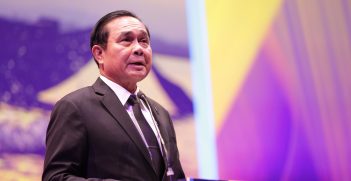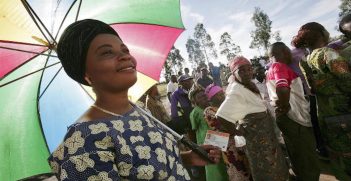2021 in Review: The Coup in Guinea: Causes and Consequences

The recent coup in Guinea follows a pattern of coups in the West African region. Recent developments demonstrate the power of military juntas and the insecurity of democracy.
It has become increasingly clear that the days of coups are not yet over on the African continent—at least not in West Africa. The continent became a hotbed for coups, counter-coups, and failed coups during the post-independence era. Coincidentally, this was the period where many African leaders had banned all except their political parties. As such, alternation in power was only possible through the barrel of the gun.
In current times, African leaders have adopted a different approach to entrench themselves in power. They have done so by removing or extending their constitutionally mandated term-limits or age limits. This phenomenon has been referred to as constitutional coup d’état.
Such orchestrations have not been devoid of conflicts which have sometimes spiralled into violence and resulted in the loss of lives. Indeed, some scholars have noted that constitutional coups are major threats to democratic deepening in contemporary Africa. While countries whose leaders amend term limits are more likely to witness electoral violence in the immediate election after such moves, the risk of electoral violence is higher for those countries where the leader scrapped term limits entirely. Surprisingly, among the African leaders who have openly condemned the recent coup in Guinea is President Museveni of Uganda—himself a coup maker who entered office in 1986 and subsequently abolished term limits in 2005, making it possible for him to remain in office forever. Many African leaders make up the league of the world’s longest-serving leaders. Moreover, it has become clear that the military in Africa are not going to stop their interference in civilian affairs. This is evident in the six coups (Niger, Chad, Mali, Guinea, and Sudan) that have occurred in the past year.
Two faces of one man
Alpha Condé’s electoral victory in 2010 was met with hope for a brighter future for Guineans, despite the allegations of fraud and violence that had characterised the polls. More importantly, the elections ushered in a new dawn of democratic rule in the country after several decades of dictatorship. However, Guinean’s high expectations for the betterment of their lives through democratic rule and proper economic management proved to be short-lived.
Approaching the end of his second term, Condé orchestrated a constitutional coup through a fraudulent referendum which made him eligible for re-election. In the lead up to the referendum and legislative elections in March 2020, the security forces used excessive force against opposition supporters. State repression peaked close to and after the October presidential elections in response to the growing anti-regime protests against his third-term. According to Amnesty International, about 50 people were killed in these events, not to mention those who suffered injuries and several others who were arbitrarily arrested and detained.
While the regime grew in violent repression, the economic situation in the bauxite-rich country was nothing to write home about. With the growing political instability coupled with increasing corruption and economic hardships, the scene was set for a potential military takeover.
The conventional view is that popular protests clearly indicate citizens’ disapproval of the current leadership. In turn, the military is incentivised to exploit this lack of legitimacy when they believe citizens will accept a change in leadership. It is therefore not surprising that Condé’s ousting by his Special Forces led by Colonel Mamady Doumbouya found favour with majority of Guineans. But history tells us that coups have rarely been a better replacement for bad civilian leadership. In fact, military regimes are known for greater human rights violations and suppression of freedoms and civil liberties.
In addition, it is well-established that “coups beget coups,”, coups are mostly followed by new dictatorships, and coups can influence Civil wars. Moreover, military regimes are no less corrupt than their civilian counterparts, although coup leaders often cite corruption and widespread poverty as key reasons for their interference. Lastly, citizens suffer the most from economic sanctions imposed by regional and international bodies as a result of coups.
The implications
If optimism alone were to be enough, then I would have fully embraced Paul Collier’s assertion that “coups and the threat of coups can be a significant weapon in fostering democracy,” especially in hitherto authoritarian regimes. However, the existing evidence suggests that the “democratisation effect” of coups is not always unidirectional, may sometimes take a longer time to be realised, or will never be achieved. Given these uncertainties, a better approach will be to address the issues that bring about coups in the first place.
In the case of Guinea, the amendment of term limits was central to the events which led to the 5 September coup. While the Economic Community of West African States (ECOWAS) has declared a “zero tolerance for power obtained or maintained through unconstitutional means,” sanctions have only been imposed against countries which have seen military takeovers and not constitutional coups. Although it can be argued that leaders who amended term limits used the required “institutional” avenues, there is no justification for such changes in the first place as it sets a bad precedent. Besides, two eight-to-ten year terms should be enough for any visionary leader to contribute their quota to the development of a country. After all, governance is a continuous process and not a “one-man” show.
As it stands now, ECOWAS has imposed sanctions on Guinea for failure of the military junta to release the ousted leader and has demanded a return to constitutional rule within six months. The military junta has made it clear that it will not be pressured by any regional body or the international community to fast-track the process of returning the country to constitutional order. However, the Afrobarometer surveys have consistently shown that the majority of Guineans prefer democracy and want their leaders to be selected through free, fair, and honest elections. If this is anything to go by, then the euphoria that surrounds the coup will decline with time.
A very long stay of the junta may lead to public outcry, which is unlikely to be tolerated by the ruling junta. Let us not forget that Doumbouya is one of 25 Guinean officials that have been shortlisted for sanctions by the European Union (EU) for alleged human rights abuses committed under President Condé’s administration. It appears that Doumbouya took inspiration from the late Jerry Rawlings of Ghana. Rawlings’ “second coming” in December 1981 lasted for more than a decade. Hopefully, we don’t witness such a lengthy transition in Guinea.
We should also take a cue from the events in Mali. Once the military tastes power and the recognition that comes with it, they may be reluctant to return to the barracks. The Guinean coup may also have a spillover effect in countries with similar political dynamics.
In sum, as long as African leaders decide to overstay their welcome, military takeovers or attempts will be inevitable in the future. This does not bode well for a region already facing serious security challenges.
This article was originally published on 30 September 2021.
Ernest Mensah Akuamoah is a PhD candidate in the School of Politics and International Relations at the Australian National University.
This article is published under a Creative Commons License and may be republished with attribution.





